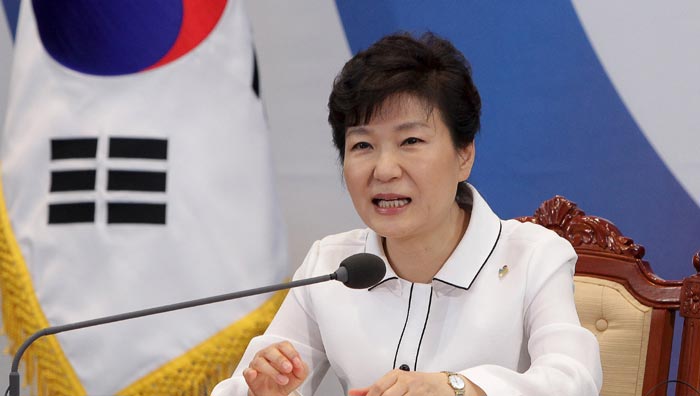President Park Geun-Hye had earlier refused to meet Shinzo Abe.
AFP/Seoul
South Korea said on Monday it had offered Japan a long-awaited leadership summit that would be a major step towards improving relations after an extended period of diplomatic rancour and mistrust.
A spokeswoman for the presidential Blue House said the South had proposed a summit between Japanese Prime Minister Shinzo Abe and President Park Geun-Hye on the sidelines of a trilateral leadership meeting being held with China in Seoul next week.
"We have made a proposal to hold the summit on November 2 but have not heard from Japan yet," the spokeswoman told AFP.
There was no immediate response from Tokyo and no official confirmation it had received the offer.
If the summit goes ahead, it will cap a series of moves in recent weeks by Seoul and Tokyo towards a rapprochement - prompted and pushed by their mutual military ally, the US.
Relations between the two neighbours have never been easy - clouded by sensitive historical disputes related to Japan's 1910-45 colonial rule over the Korean peninsula and, in particular, the issue of Korean "comfort women" forcibly recruited to work in Japanese wartime military brothels.
Since taking office in February 2013, Park has repeatedly refused to meet one-on-one with Abe, arguing that Tokyo has yet to properly atone for its past actions.
US frustration
The rift has frustrated Washington, which would prefer its two key Asian allies to focus together on containing an increasingly assertive China.
The last summit was in December 2011 between the then-South Korean and Japanese leaders Lee Myung-Bak and Yoshihiko Noda.
The trilateral leadership meetings with China were initiated in 2008 and held annually until 2012 when they were suspended after Seoul-Tokyo relations went into one of their regular tailspins.
Premier Li Keqiang will represent China at the gathering in Seoul and will hold a separate one-on-one meeting with President Park.
Park had initially signalled her willingness to meet Abe during a recent visit to Washington but stressed that in order for the summit to be "meaningful" there would have to be timely progress on the comfort women issue.
Japan maintains that the issue was settled in a 1965 normalisation agreement, which saw Tokyo make a total payment of $800mn in grants or loans to its former colony.
While Abe remains deeply unpopular with the South Korean public - North Korean leader Kim Jong-Un enjoys a higher approval rating - repeated surveys have shown majority support for a summit and greater diplomatic cooperation.

